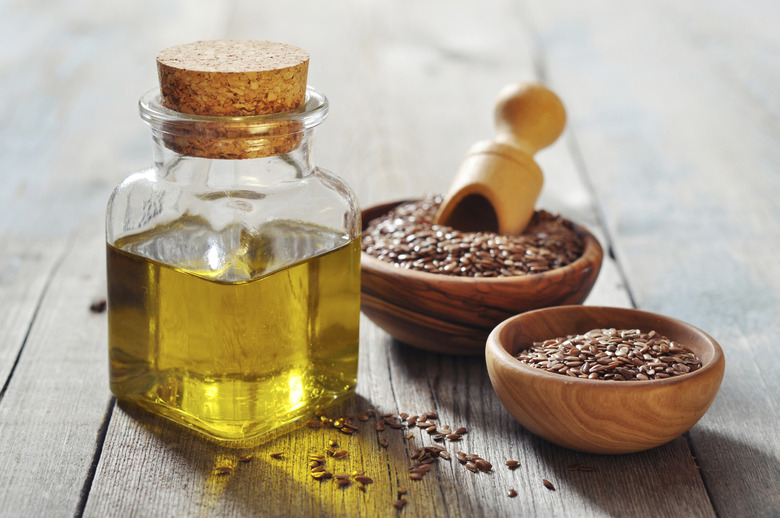Can Cooking Oils Be Used To Prevent Hairballs?
Hairballs are a messy business as well as rather uncomfortable for your cat, but they're a part of this animal's very natural grooming process and tend to occur once every week or two. Indeed, it's very normal for your cat to ingest hair while fastidiously cleaning himself, resulting in blockages and hairballs that are especially frequent during the season when your cat may shed more. If you're looking for the best thing to give a cat for hairballs, the answer is twofold: lubrication and extra fiber in the form of certain oils and foods and regular brushing of your cat's coat to remove excess hair.
Before you change your cat's diet or consider an additive to address hairballs, speak with your veterinarian. In some cases, your cat's coughing and regurgitation may be caused by something other than a hairball, such as a respiratory illness, like asthma.
As you learn what's the best thing to give a cat for hairballs, consider natural remedies found in the kitchen, the produce aisle, and your local pet store.
Coconut oil for cat hairballs
Coconut oil for cat hairballs
It is possible to use coconut oil as a natural hairball remedy for cats. Simply add a little bit of coconut oil to their diet. Coconut oil is believed to have natural anti-inflammatory substances in it that can help reduce inflammation in the respiratory tract that can occur from the constant coughing of a cat trying to regurgitate hairballs. The moisture that the coconut oil adds to the diet can help soften the hairball and allow your cat to pass it more easily. As a bonus, it is also said to help alleviate some skin conditions when used topically.
However, it is possible that coconut oil may cause an allergic reaction in your cat. Slowly introduce the coconut oil by allowing your cat to lick a little bit off your finger. Wait two to three hours and observe your cat for any signs of an allergic reaction. Another controversial concern about coconut oil is that feeding it regularly will also increase the overall fat in the diet, and it can worsen pancreatitis and increase the amount of lipids or fats in the blood to unhealthy levels.
While occasional use of coconut oil as a natural hairball remedy for cats can work, if your cat is getting hairballs regularly enough that ongoing use of coconut oil is needed, this might be something to discuss with your vet. Check with your vet to be sure that the possible weight gain and impact on internal organs is an acceptable risk for your cat.
Olive oil for hairballs in cats
Olive oil for hairballs in cats
Some cats really seem to love the taste of olives, particularly green olives, because they contain a chemical substance that is similar to catnip. It's possible that olive oil may have the same reaction for your cat. In general, both olives and olive oil seem to be safe but should be given in modest amounts.
It's probably OK to let your cat lick olive oil off your finger or to pour it onto his food, but it's not something you should let him have at every meal. That's because too much of any fat could lead to obesity and stomach issues, like diarrhea and vomiting.
Other oils for cat hairballs
Other oils for cat hairballs
Fish oil is another kitchen-based remedy that adds fatty acids to your cat's diet and can help minimize hairballs. When using mineral oil for your cat's hairball condition, a teaspoon for every 10 pounds of your kitty's body weight can be added to her food bowl once or twice a week. (You can also check with your vet for dosage recommendations.)
Fiber for cat hairballs
Fiber for cat hairballs
If oil isn't your go-to natural hairball remedy for cats, you might head down the produce aisle instead. Adding more fiber to your feline's diet in the form of fruits and veggies is another way to ease the passage of fur in your pet's digestive tract and reduce the number of hairballs you see on your kitchen floor. One to try is vitamin-rich pumpkin. Rather than struggling with an actual squash, choose the canned variety that you see every fall in the grocery store.
Fruits and vegetables, such as carrots and apples, also add much-needed fiber; just ask your vet to ensure you're not offering a harmful variety of produce. Other oil alternatives include various fresh grass varieties. Pick up a container of wheat, oats, or rye at your local garden center and let your kitty chomp away.
You local pet store has loads of food and treat formulations that purport to move your cat's hair through his system and help prevent the creation of hairballs. Most foods that you'll find on the shelves contain added fiber to fight hairballs as well as fatty acids to promote a lustrous, healthy coat. Pet stores also sell hairball remedies in the form of gels and pastes. Ask your vet about these soft chews, which are basically mild laxatives that help hairballs pass through your cat's system more efficiently.
References
- Cornell University College of Veterinary Medicine: The Danger of Hairballs
- American Society for the Prevention of Cruelty to Animals: Minimizing Hairballs in Cats
- The Humane Society of Greenwood: Cat Care
- Canadian Living: 5 Surprising Health Benefits of Coconut Oil for Your Cat
- The Drake Center For Veterinary Care: The Risks and Benefits of Coconut Oil for Pets
- Hills Pet: Are Olives Safe for My Cat?
